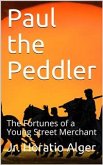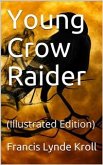Alger is the original rags-to-riches guy, often credited with inventing the strive-and-succeed spirit that inspired boys to work hard and advance themselves in order to achieve the American Dream. This theme resonates throughout his numerous writings. This story features Phil, a twelve-year-old Italian boy whose poor parents sold him to a Faginesque-like character called the padrone. The padrone has a gang of boys who he sends out each day with the edict that they earn $2. Phil earns his money by playing his fiddle. After many adventures with his friends, including Paul the Peddler, he finally manages to escape the bonds of the padrone.
Bitte wählen Sie Ihr Anliegen aus.
Rechnungen
Retourenschein anfordern
Bestellstatus
Storno









